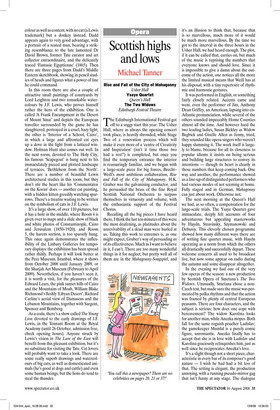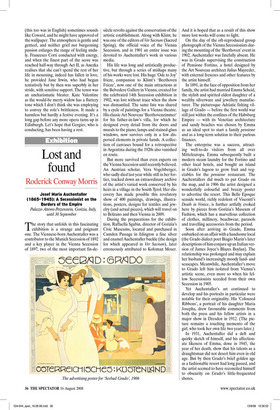Opera
Scottish highs and lows
Michael Tanner
Rise and Fall of the City of Mahagonny Usher Hall Ysaye Quartet Queen’s Hall The Two Widows Edinburgh Festival Theatre
The Edinburgh International Festival got off to a soggy start this year. The Usher Hall, where as always the opening concert took place, is heavily shrouded, while Stage Two of a renovation process which will make it even more of a ‘centre of Creativity and Inspiration’ (isn’t it time those two had a rest?) is completed, but once you find the temporary entrance the interior is reassuringly familiar, and we began with a large-scale piece for big forces, Brecht– Weill’s most ambitious collaboration, Rise and Fall of the City of Mahagonny. H.K. Gruber was the galvanising conductor, and he persuaded the brass of the fine Royal Scottish National Orchestra to surpass themselves in virtuosity and volume, with the enthusiastic support of the Festival Chorus.
Recalling all the big pieces I have heard there, I think the last ten minutes of this were the most deafening, as platitudes about the unrevivability of a dead man were hurled at us. Taking this work to extremes is, as one might expect, Gruber’s way of persuading us of its effectiveness. Much as I want to believe in it, I can’t. There are too many wonderful things in it for neglect, but pretty well all of them are in the Mahagonny-Songspiel, and it’s an illusion to think that, because that is so marvellous, much more of it would be much more marvellous. By the time we got to the interval in the three hours in the Usher Hall, we had heard enough. The plot, if it can be called that, carries on, but much of the music is reprising the numbers that everyone knows and should love. Since it is impossible to give a damn about the outcome of the action, one notices all the more the limited musical means that Weill has at his disposal, with a tiny repertoire of rhythmic and harmonic gestures.
It was performed in English, or something fairly closely related. Accents came and went, even the performer of Jim, Anthony Dean Griffey, an American, lapsing into cisAtlantic pronunciation, while several of the others sounded impeccably Home Counties almost all the time. And however hard the two leading ladies, Susan Bickley as Widow Begbick and Giselle Allen as Jenny, tried, they sounded like opera singers who weren’t happy slumming it. The work itself is largely to blame, because for all its closeness to popular idioms it insists on being serious and building large structures to convey its intentions — though its heart is clearly in those numbers that keep coming back. One way and another, the performance showed us a line-up of distinguished performers who had various modes of not seeming at home. Fully staged and in German, Mahagonny can just about work. Otherwise not.
The next morning at the Queen’s Hall we had, as so often, a compensation for the large-scale trials. The Ysaye Quartet gave immaculate, deeply felt accounts of four adventurous but appealing masterworks by Haydn, Stravinsky, Szymanowski and Debussy. This cleverly chosen programme showed how many different ways there are of writing fine quartet music, with Haydn operating as a norm from which the others all drastically and successfully depart. These welcome concerts all used to be broadcast live, but now some appear on radio during the autumn and some disappear altogether.
In the evening we had one of the very few operas of the season: a new production by Scottish Opera of Smetana’s The Two Widows. Unusually, Smetana chose a nonCzech text, but made sure the music was permeated by polka rhythms and that the action was framed by plenty of central European peasants. There are four characters, and the subject is serious: how does one cope with bereavement? The widow Karolina looks for another man, while Anezka mopes. Both fall for the same roguish poacher Ladislav; the gamekeeper Mumlal is a purely comic figure, unromantic. Anezka finally has to accept that she is in love with Ladislav and Karolina graciously relinquishes him, just as well since he reciprocates Anezka’s love.
It’s a slight though not a short piece, characteristic in every bar of its composer’s good nature — I wish he had had a bit less of that. The setting is elegant, the production annoying, with a running pseudo-mirror gag that isn’t funny at any stage. The dialogue (this too was in English) sometimes sounds like Coward, and he might have approved of the wallpaper. The atmosphere is gentle and genteel, and neither grief nor burgeoning passion enlarges the range of feeling unduly. Francesco Corti conducted with energy, and when the finest part of the score was reached half-way through Act II, as Anezka realises that she can’t spend the rest of her life in mourning, indeed has fallen in love, he provided Jane Irwin, who had begun tentatively but by then was superbly in her stride, with sensitive support. The tenor was an uncharismatic bleater. Kate Valentine as the would-be merry widow has a fluttery tone which I don’t think she was employing to convey the role’s brittleness. It made a harmless but hardly a festive evening. It’s a long gap before any more opera turns up in Edinburgh. Let’s hope that Gergiev, who is conducting, has been having a rest.



























































 Previous page
Previous page